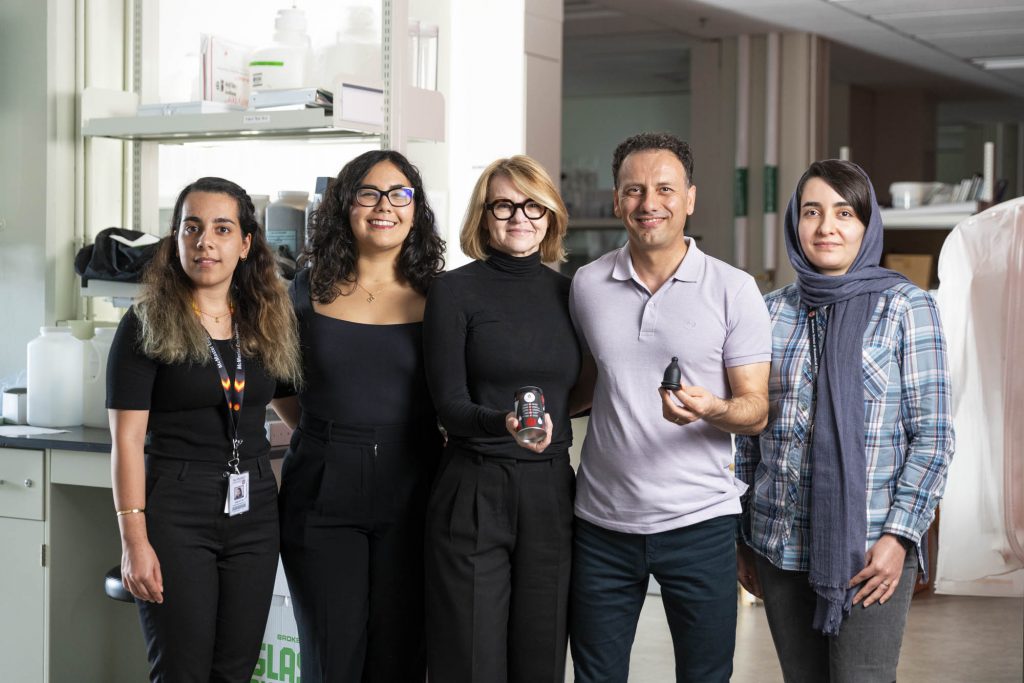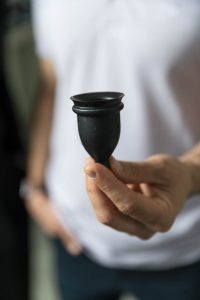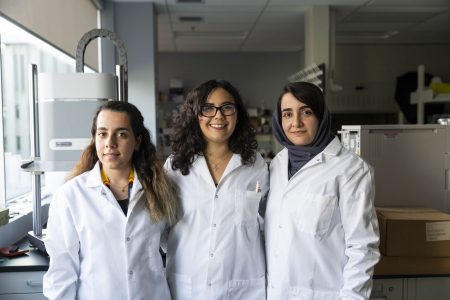Engineering researchers tackle period poverty with innovative design

BY KEIKO KATAOKA
November 8, 2023
McMaster Engineering professors and student researchers are working with a social enterprise partner on innovations to an essential personal product — the menstrual cup — in the hope of addressing period poverty and improving women’s health.
Canada Research chairs Tohid Didar and Zeinab Hosseinidoust are working with Bfree Cup inventor and Women’s Global Health Innovations founder Leisa Hirtz to make the cup more hygienic and user-friendly and develop a substance that can detect and treat vaginal infections.
 Approximately 60,000 people across the globe use a Bfree Cup, an environmentally friendly alternative to expensive and one-time use pads and tampons.
Approximately 60,000 people across the globe use a Bfree Cup, an environmentally friendly alternative to expensive and one-time use pads and tampons.
More absorbent and cleaner to use
The McMaster team’s engineering expertise is integral to addressing a key piece of feedback from menstrual cup users: Their concerns about spillage when the cup is removed.
“We’re putting our engineering knowledge and tools to work,” says Didar, whose years of research on bio-functional interfaces is used in the design and development of advanced biomaterials, biosensors, medical coatings and organs-on-chips for diagnostics and therapeutics.
The first challenge for the research team is designing and testing an absorbent gel that can contain menstrual fluid within the cup for tidy and flushable disposal with no harm to the environment.

Biomedical engineering PhD students Fereshteh Bayat and Shaghayegh Moghimikandelousi, and Lubna Najm, a research associate in the Didar Lab, are focusing their efforts on creating a superabsorbent material to make the Bfree Cup more user-friendly.
“I like the absorbency challenge, but I know we can do more,” says Didar.
Fighting infection and worse
That’s where Hosseinidoust’s research expertise in bacteriophages — viruses that target specific bacteria — comes in.
Phages are potent antimicrobials whose ability to target only bad bacteria are giving them a global renaissance as an alternative to antibiotics, which kill good bacteria along with the bad.
“If we can develop a biosensor gel for the cup that can detect bacteria, then potentially use the cup to also release bacteriophages, we can proactively treat vaginal disease,” Hosseinidoust explains.
Complications of undiagnosed and untreated disease like bacterial vaginitis can lead to infertility, increased risk of sexually transmitted infections and low birth weight.
“The benefits of gathering health information using a menstrual cup and activating treatment through the same means will be not only impactful in remote or developing regions, but women’s health globally,” says Hosseinidoust.
Sparking a paradigm shift in women’s health
“Information and education are critical, but we need engineers to come in and design new solutions, some of which might be quite disruptive,” says Hosseinidoust. “Sometimes you need to change the picture in order to advance and have an impact.”

The researchers share a passion for their work and commitment to women’s health.
“There’s still stigma around periods and we need to break down barriers and focus on something essential to women,” says Najm.
Moghimikandelousi agrees. “I find it empowering working alongside a team of primarily women to address a women’s health issue,” she says.
Hirtz feels confident in the trajectory of the Bfree Cup in the hands of McMaster researchers.
“Research done at such a reputable university helps strike down some of the taboos with menstrual cups and period health,” she says.
“There’s so much room for research in women’s health. I’m excited to see Bfree Cup become the most innovative menstrual product on the market.”
The cup’s creation was inspired by Hirtz’s travel to remote villages in Uganda and Kenya, where she spoke to women who had to use unsanitary mattress stuffing or old socks to manage their periods. As a result of challenges faced during menstruation, women in these regions became stigmatized and excluded from daily activities.
“Being able to menstruate with dignity and proper hygiene is a human right,” says Hirtz.


